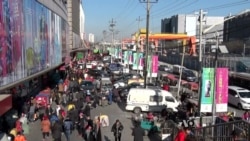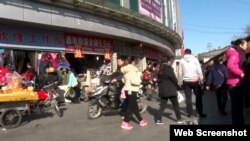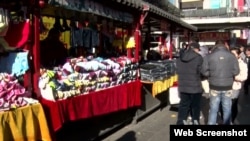From dawn to dusk, Beijing’s Jingwen wholesale market is bustling with activity.
Mounds of merchandise are piled up everywhere and a seemingly endless supply of dolly carts navigate the narrow shopping halls.
But the hum of commerce belies a rumbling beneath the surface; a shifting unease felt at market places and businesses across the country.
2015 was a tough year for China’s economy, which saw its slowest growth in nearly 25 years and next year looks much the same. For some of the nearly 2,000 wholesalers at Jingwen market that uncertainty is growing.
Double 'whammy'
One wholesaler surnamed Ye says that she’s not only have trouble selling merchandise, but retailers are sending goods back and she has no choice but to accept.
“I don’t know what is going on but this year has been horrible. We’ve worked in Beijing for years and always manage to make some money, but it looks like this year we could lose money,” she said.
Like many in the market, Ye is from Wenzhou, an entrepreneurial powerhouse in China’s southeastern Zhejiang province that the market derives its name from: Jing for Beijing and Wen for Wenzhou.
And while Ye has worked in Beijing for years, the slowdown in business is not the only uncertainty.
Authorities in Beijing are closing down markets such as Jingwen and moving them far away from the city’s center. In some cases, markets are being move more than an hour away to neighboring Hebei province.
Authorities say the move will ease population and traffic strains, and help with the problem of pollution.
Many of the city’s administrative offices also are slated to move out to the eastern part of the city, with substantial progress expected as early as 2017, according to the Beijing city government. The move is expected to attract some 400,000 to the eastern suburb of Tongzhou.
Population controls
Beijing has also vowed to “strictly control population growth,” for the capital city, setting a ceiling of 23 million. That number, analysts say, is too low and risks robbing the Chinese capital of much-needed diversity.
Tsinghua University professor Cai Jiming said an international city needs citizens from all kinds of backgrounds.
“There should be college students, graduate students, scientists as well as a large number who work in the services industry. If you get rid of all these people, a city loses its vitality,” he said.
Cai said that based on research he and others have carried out, Beijing could accommodate as many as 30 million people.
“Ultimately, what the total population becomes should be something for the market to decide. Look at Tokyo, it already has a population of 33 million and yet it does not feel as congested as Beijing,” he said.
Future uncertain
Jingwen market was established in 1994 when China’s economy was just taking off, but what comes next is unclear.
Some worry it could disappear, while others say it will get a "facelift" and go upscale.
Wholesalers say they are looking to the market for answers, not to government efforts to micro-manage where they can do business.
One wholesaler surnamed Xing said plans to move markets far away from the city’s center are unrealistic.
“My focus is on what people want. There’s always a way to make money. Right now we’re selling low-end goods and I can do that. If you want to do more high-end goods, I can do that as well,” he said.
Another wholesaler, surnamed Su, who has been working at Jingwen market for nine years, said that if changes come to the market, he may move back to his hometown.
“You can really do business anywhere. You can open a store online and do business online. There are many paths to take,” Su said.
China’s economy blossomed by allowing people more freedom to choose their own path, but as the economy struggles, officials are getting more and more skittish and seemingly focused on exerting more controls than letting go.
Instead of tightening up, analysts say officials should focus less on rigid population targets, and instead mimic wholesalers who have already learned how to adapt to an ever-changing market.















